PREVIOUS
Economic Survey 2023-2024 Part - 03
August 4 , 2024
499 days
2401
0
(இதன் தமிழ் வடிவத்திற்கு இங்கே சொடுக்கவும்)
Renewable Energy Sector
- PM-KUSUM scheme: Installed 166 MW decentralized solar capacity and solarized 3.26 lakh agricultural pumps.
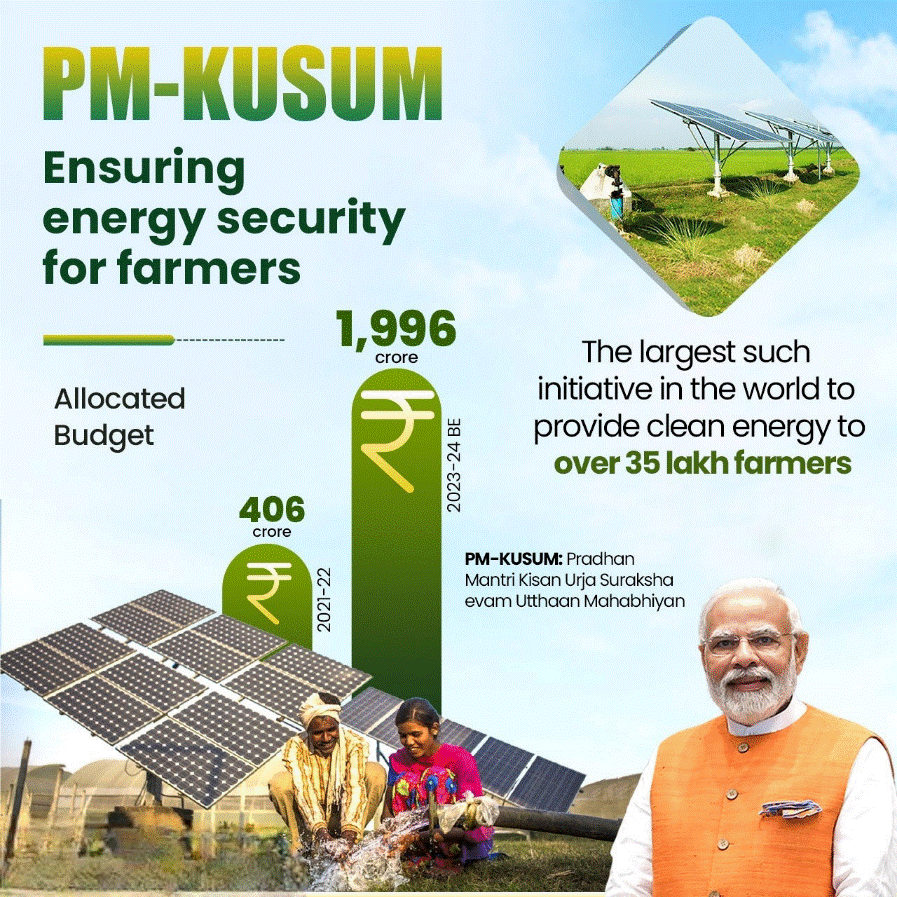
- High Efficiency Solar PV Modules PLI Scheme: Four manufacturers began production with ₹24,000 crore outlay.
- Solar Parks Scheme: 39.7 GW capacity sanctioned for 56 parks, with 11.59 GW was commissioned.
- PM-Surya Ghar Scheme: This scheme is aiming for 30 GW residential rooftop solar capacity by FY27 with ₹75,021 crore outlay.
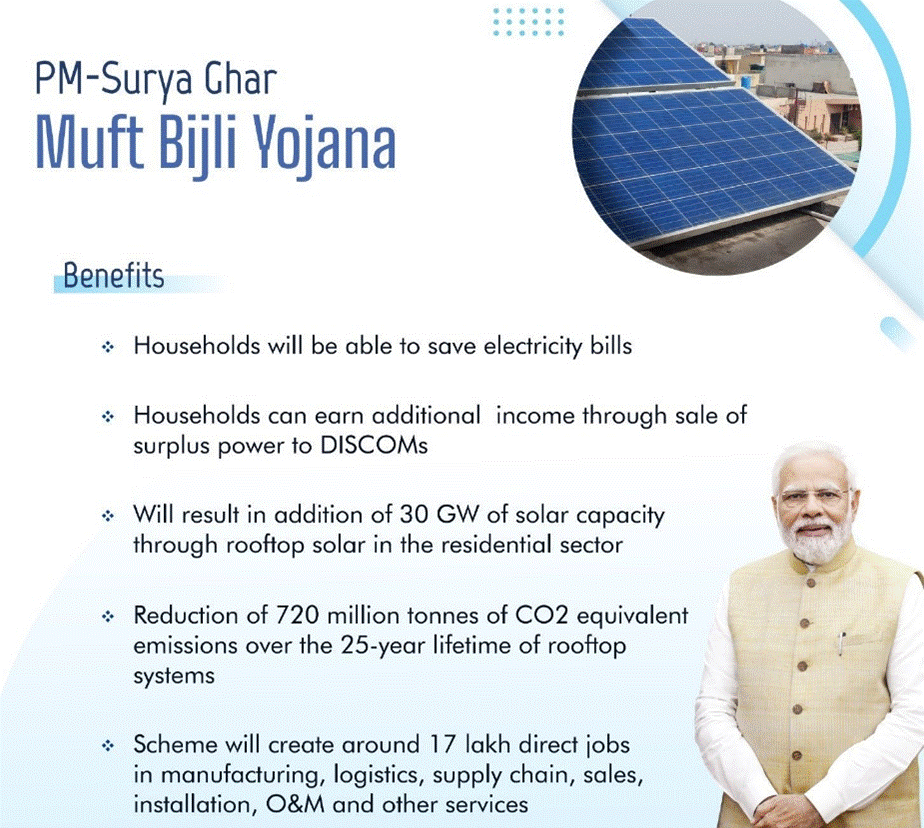
- Wind Power: Installed capacity of 45.89 GW is making India fourth globally.
- Solar Power for PVTG Habitations: Off-grid solar for 1 lakh un-electrified PVTG households.
- Green Energy Corridor: Completed 9,111 km transmission lines and 21,303 MVA substations in GEC-I; GEC-II ongoing.
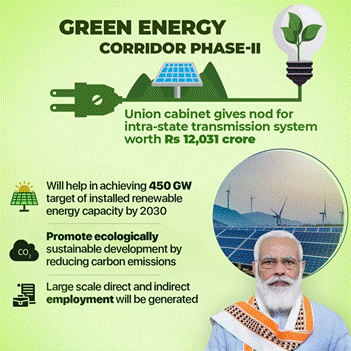
- Bio Energy Programme: Installed 9.4 GW biomass power, 249.74 MW waste-to-energy, and 51.04 lakh biogas plants.
- National Green Hydrogen Mission: Targets 5 MMT annual production, 125 GW renewable energy capacity, ₹8 lakh crore investment by 2030.
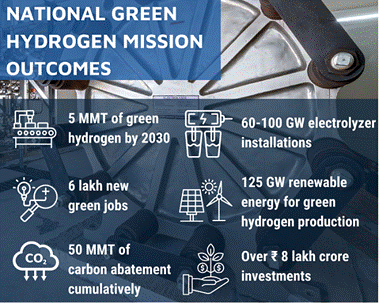
Sports Sector
- Khelo India: Sanctioned 323 infrastructure projects for ₹3,073.7 crore.
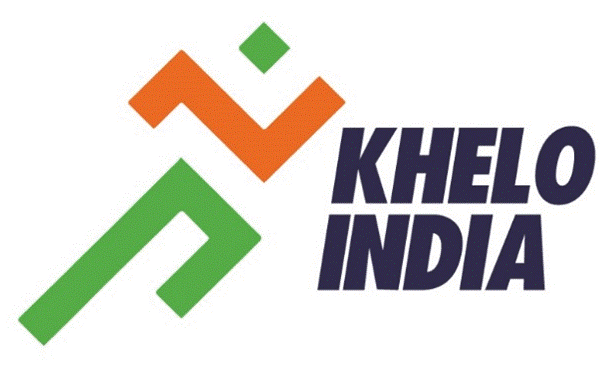
- National Sports Development Fund: Sanctioned 10 projects in FY24.
- Sports Authority of India: Approved nine infrastructure projects, completed 13 in FY24.
- National Sports University, Imphal: ₹611.74 crore project, 56% completed.
Steel (Barthan) Bank in Siddipet District, Telangana
- It provides steel utensils to reduce plastic waste.
- It reduces plastic waste, raises awareness, and generates income for communities.
- It is expected to reduce 6-8 kg of plastic waste per event.
Sailam Village, Mizoram - Sustainable Water Supply
- Transformation: From water-scarce to water-sufficient under Jal Jeevan Mission.
- System: 24x7 community-managed water supply.
- Infrastructure: 900 KLD water storage tank, solar pumps, and 700 KLD zonal reservoir.
Dam Rehabilitation and Improvement Project (DRIP)
- Objective: Improve dam safety and performance.
- DRIP Phase-I: Rehabilitated 223 dams with ₹2,567 crore spent.
- DRIP Phase II and III: Targeting 736 dams with a ₹10,211 crore budget.
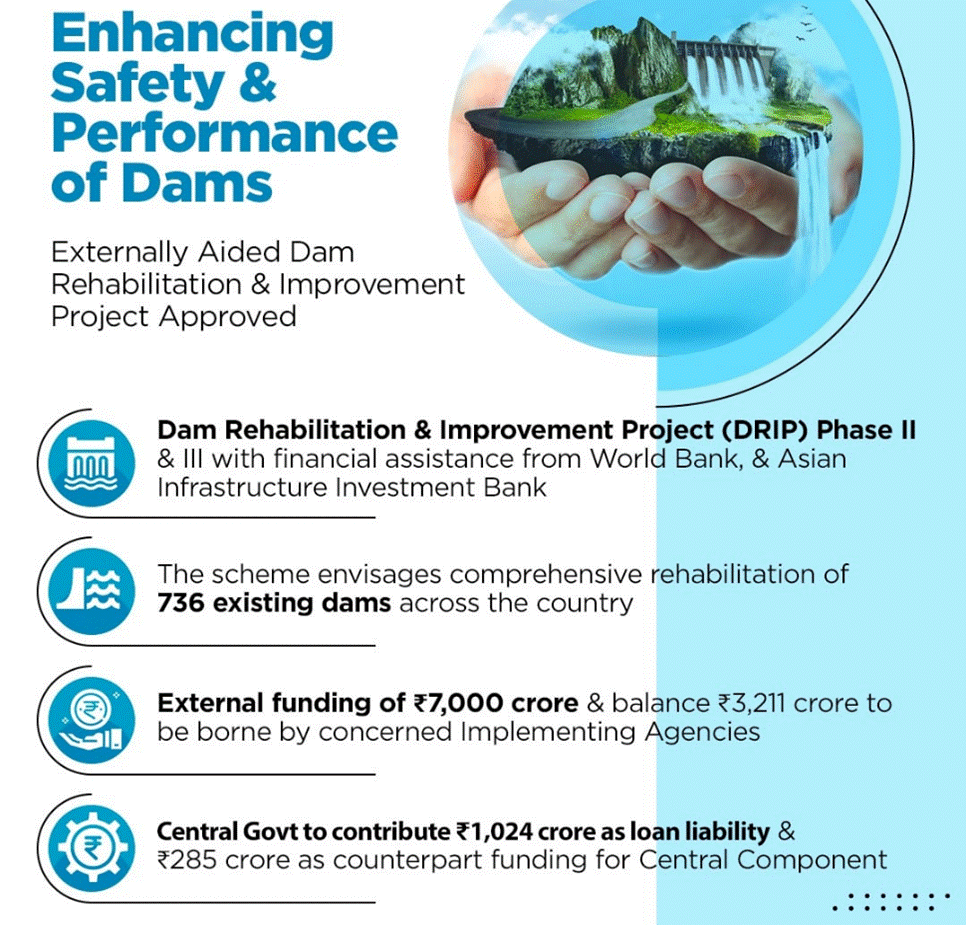
Atal Bhujal Yojana
- Goal: Groundwater management with community participation.
- Outlay: ₹6,000 crore, implemented in 80 districts of seven States.
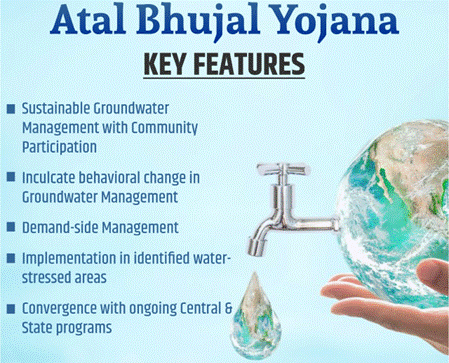
Pradhan Mantri Krishi Sinchayee Yojana (PMKSY)
- Launch: 2015-16 to enhance water access for farming.
- Achievements: Completed 58 projects and 2,497 schemes, irrigating 25.80 lakh hectares.

Interlinking of Rivers Project
- Goal: To connect 30 river links.
- Priority Projects: Ken Betwa, Modified Partbati-Kalisindh-Chambal, and Godavari-Cauvery links.
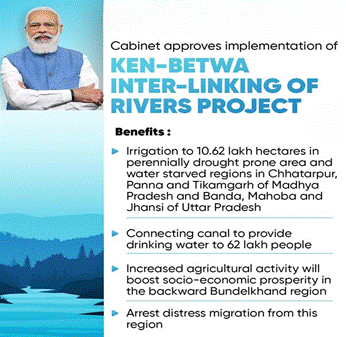
Smart Cities Mission (SCM)
- Launch: June 2015 to develop 100 smart cities.
- Progress: Completed 7,153 projects worth ₹1.43 lakh crore by June 2024.
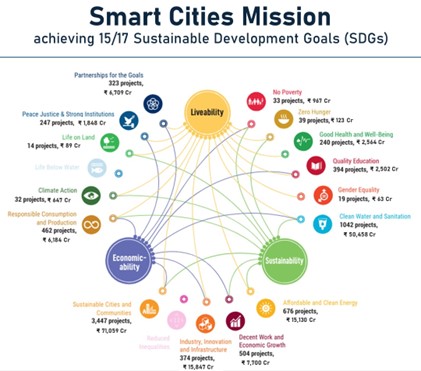
BharatNet Project
- Objective: Broadband connectivity to all Gram Panchayats (GPs).
- Progress: Connected 2,11,021 GPs by optical fibre, with future plans for FTTH connections.
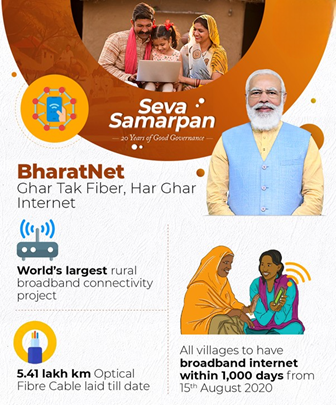
GI Cloud - ‘MeghRaj’
- Goal: Deliver ICT services via Cloud to government departments.
- Progress: 25,806 virtual machines and 1,767 government applications using GI Cloud.
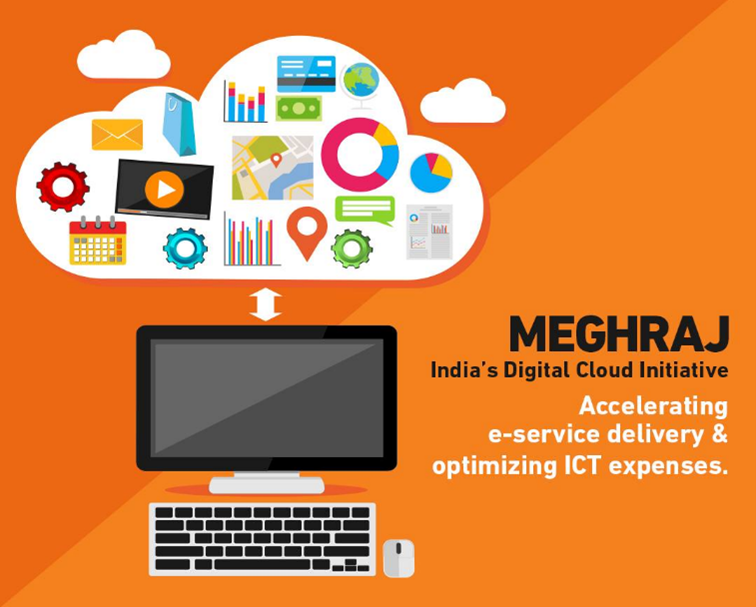
Climate Change Achievements
- Emission Intensity Reduction: Reduced by 33% from 2005 to 2019.
- Non-Fossil Fuel Capacity: Reached 40% of electric installed capacity.
- International Contributions: Through initiatives like ISA, CDRI, LeadIT, IRIS, and the Big Cat Alliance.

Initiatives Fostering Rural Entrepreneurship
- Lakhpati Didis Initiative
- Launched in 2023, this initiative aims to uplift three crore SHG households to a minimum annual income of ₹1 lakh within three years.
- It focuses on diversified livelihood activities, district-level planning, household support, Government department convergence, and capacity building of staff and community members.
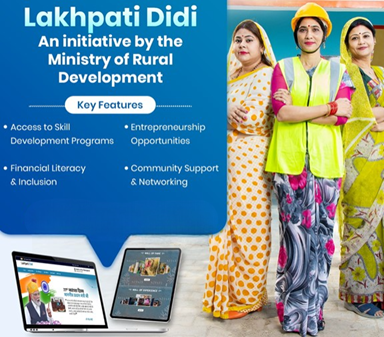
- Saras Aajeevika Portal and eSARAS Mobile App
- Launched in 2023, these platforms showcase a wide array of authentic handcrafted products made by SHGs, such as linen items, furniture, apparel, pickles, etc.
- By creating a dedicated marketplace for their indigenously crafted products, the platform catalyzes rural women into new-age entrepreneurs.
- Start-Up Village Entrepreneurship Programme (SVEP) and Aajeevika Grameen Express Yojana (AGEY).
- Start-Up Village Entrepreneurship Programme (SVEP):
- Supports entrepreneurs in rural areas in setting up local enterprises by promoting knowledge about business feasibility management, providing start-up loan finance access, and scaling up existing enterprises.
- 2.97 lakh enterprises have been formed in 221 blocks of 29 states/UTs.
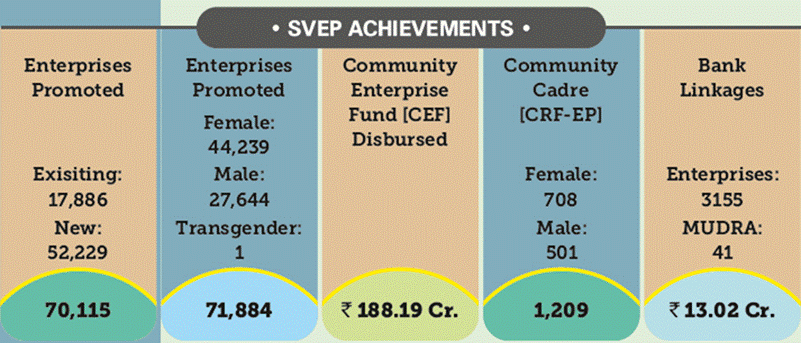
- Aajeevika Grameen Express Yojana (AGEY):
- Provides safe, affordable, and community-monitored transport services to rural areas.
- Around 2,333 vehicles are operational in 26 states, connecting remote rural villages.
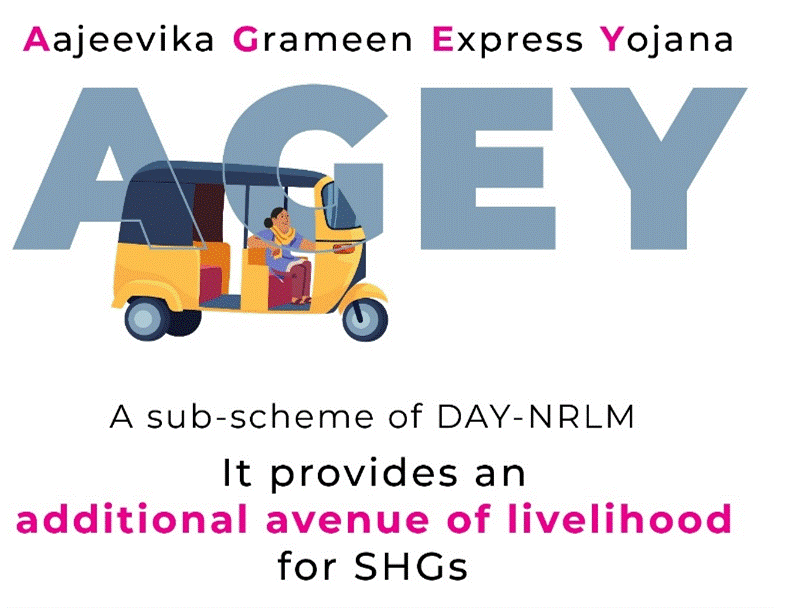
- Rural Self Employment Training Institute (RSETI) Scheme
- A sub-scheme of NRLM is aimed at strengthening rural entrepreneurship.
- RSETIs are district-level Self Employment Training Institutes managed by banks and funded by the Ministry of Rural Development.
- They provide the free-of-cost skill training, credit assistance, and mentorship to rural unemployed youth aged 18-45 years, with an approach of short-term training & long-term hand-holding of entrepreneurs.
- Since 2009, 50.72 lakh candidates have been trained, and 36.23 lakh candidates have been settled as entrepreneurs/apprentices till June 2024, with a settlement rate of over 72 percent.
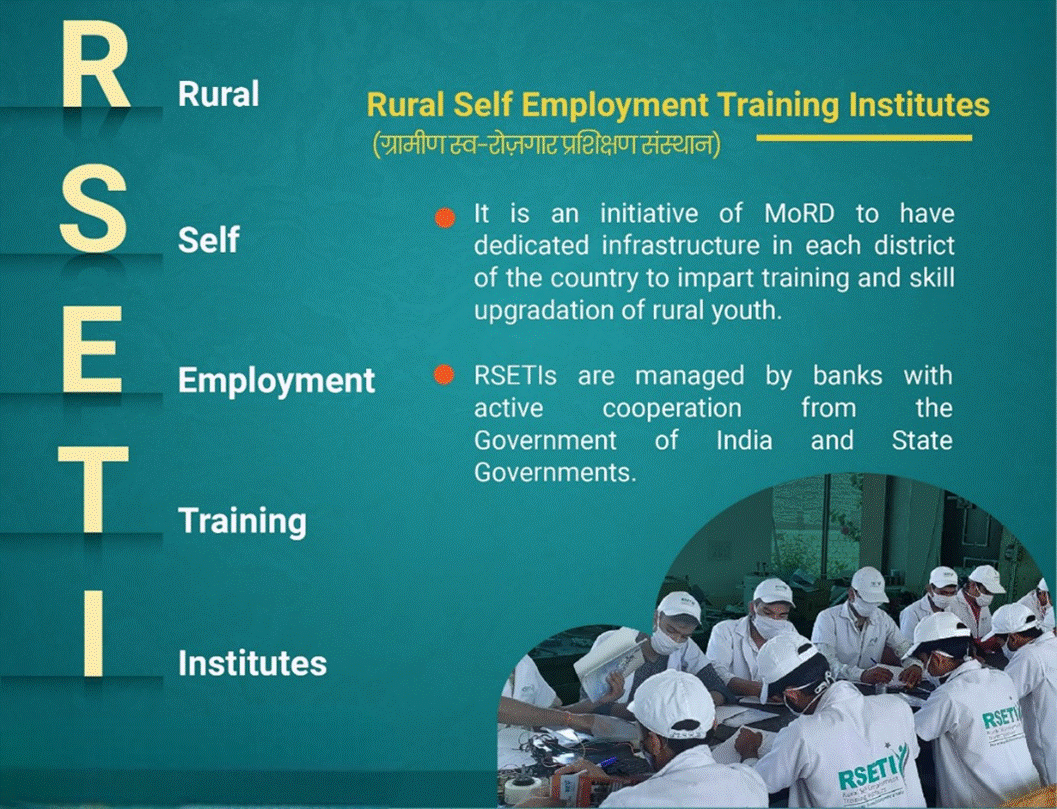
- Initiatives:
- Self-Help Groups (SHGs):
- NRLM promotes the formation and strengthening of SHGs to enable collective savings, credit, and income-generating activities.
- SHGs act as a crucial financial support system for rural entrepreneurs.
- SHG-Bank Linkage Programme:
- NRLM facilitates the linkage of SHGs with formal banking institutions to ensure easy access to credit and financial services.
- This program helps SHG members secure loans for business ventures.
- Financing Rural Entrepreneurship:
- NABARD supports SHGs and micro-entrepreneurs with training and funding, aiding them in selling products online.
Digitisation Initiatives to Improve Rural Governance
- e-Panchayat Mission Mode Project: Automates workflow processes of Panchayats, benefiting elected members and functionaries.
- e-Gram SWARAJ: Digital Panchayat platform providing a complete profile of Gram Panchayats.
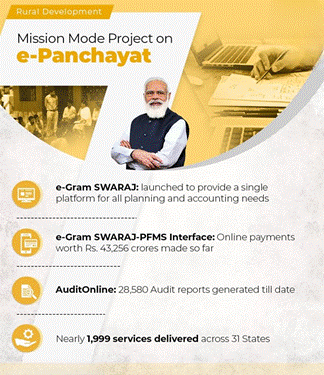
- SVAMITVA Scheme: Provides 'Record of Rights' to rural household owners, enabling property monetization and reducing disputes.
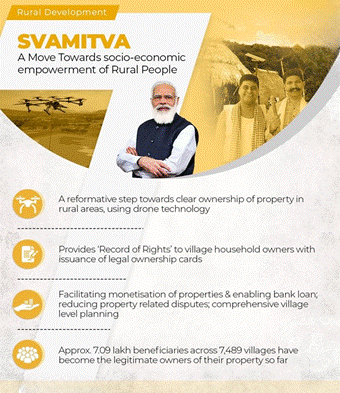
Contributory Pension Schemes
- Pradhan Mantri Shram Yogi Maan-Dhan (PM-SYM): Launched in 2019, with over 50 lakh workers enrolled.
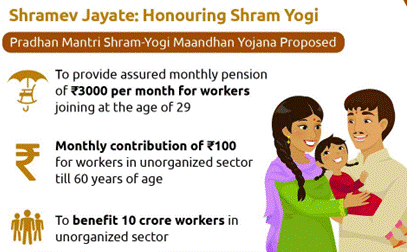
Agriculture Sector:
- Programs like the Pradhan Mantri Fasal Bima Yojana (PMFBY) and the National Agriculture Market (eNAM) focus on skill development in agriculture and allied sectors.
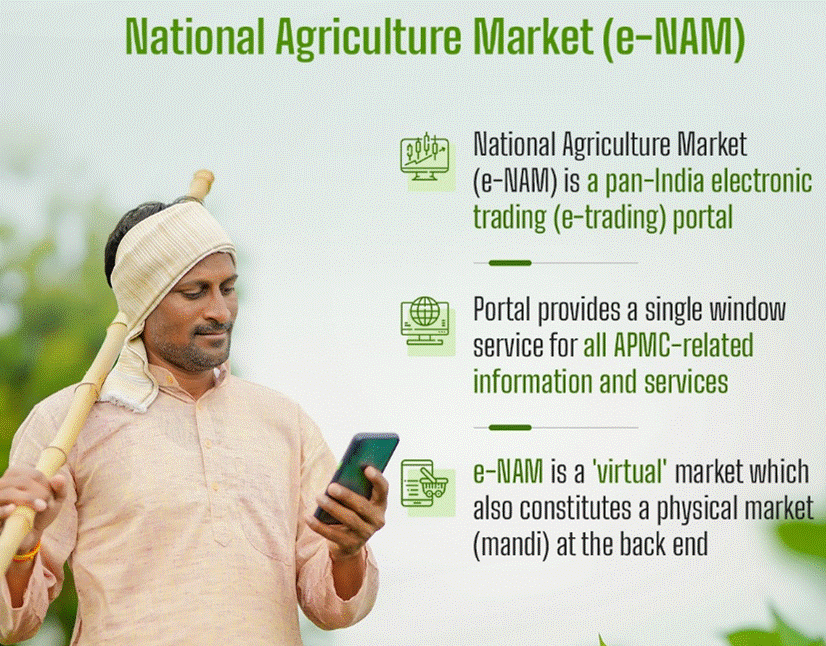
- Agricultural Growth
- The agricultural sector grew at an average rate of 4.18% over the past five years, supporting 42.3% of the population.
- Agricultural Credit
- Total credit disbursed: ₹22.84 lakh crore for crop and term loans.
Recent Technology Interventions in PMFBY
- Digi-Claim-Payment Module
- Integrates the National Crop Insurance Programme (NCIP) with the Public Financial Management System (PFMS) for transparent and efficient claim settlement.
- Yield Estimation Based on Technology (YES-Tech)
- Uses technology for accurate crop yield estimates, piloted in 100 districts across several states.
- Weather Information Network & Data System (WINDS)
- Plans to install Automatic Weather Stations (AWS) at every block and Automatic Rain Gauges (ARG) at every Gram Panchayat to improve weather data access for farmers.
- Collection of Real-time Observations and Photographs of Crops (CROPIC)
- Collects crop photographs to verify and assess crop damage, aiding in yield estimation.
Tourism and Hospitality Sector:
- Initiatives like the Hunar Se Rozgar Tak (HSRT) scheme aim to provide skill training in the tourism and hospitality sector to boost employment and entrepreneurship.
State-Level Initiatives:
- Maharashtra:
- The state government has launched the Maharashtra State Skill Development Society (MSSDS) to provide skill training and employment opportunities to youth.
- Karnataka:
- The Karnataka Skill Development Corporation (KSDC) focuses on providing industry-relevant skill training and promoting entrepreneurship.
- Rajasthan:
- The Rajasthan Skills and Livelihoods Development Corporation (RSLDC) aims to enhance the employability of youth through skill training programs.
Public-Private Partnerships:
- Tata Institute of Social Sciences (TISS):
- TISS has partnered with the Ministry of Skill Development and Entrepreneurship (MSDE) to provide skill training and create job opportunities.
- Larsen & Toubro (L&T):
- L&T has collaborated with the National Skill Development Corporation (NSDC) to provide skill training in the construction sector.
- Infosys:
- Infosys has launched the Infosys Springboard program to provide free digital skills training to students and professionals.
Leave a Reply
Your Comment is awaiting moderation.


